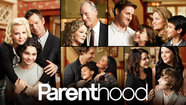
As I watched Parenthood a few months ago, the Braverman family began dealing with major health issues in season four. Grandfather Zeek was diagnosed with heart trouble, and daughter-in-law Kristina was diagnosed with breast cancer. What these two family members had in common was that they began lying to their adult children about their health. Zeek didn’t want his adult children to know that he was having health issues since the problems might not lead any trouble. He didn’t want anyone fussing over him. He preferred to use denial to cope with his health issues. For reasons that are hard to define, Adam and Kristina didn’t want to tell the family that they were facing breast cancer; they outright lied to their college aged daughter because they didn’t want her to worry or get distracted from her education.
Unfortunately, this tactic of coping with stressful issues is all too familiar to me. My family of origin and my ex’s family of origin tend to take the same approach to health issues: Adult children are still seen as children, and parents try to “protect” the adult children from bad news. Yet adult children are actually adults. They are, for the most part, capable of understanding and coping with issues about life and death.
In my own family, my father was not going to tell me when my uncle died of ALS until after the funeral. My widowed aunt made it clear that my father had to inform me. The death was not a surprise as ALS is horrible degenerative disease. My health was not going to allow me to travel to the funeral, yet it still was the right thing to tell me about the death. My father didn’t want me to tell my children (who were ages 10 to 13), but I insisted otherwise. They weren’t close to my uncle, but they needed to know that he had died. As my father finally came to terms with my decision, he said, “I guess it’s better than them coming to visit and him not being here.” While this attempt to protect us from the pain of death was well-intended, it also failed to respect our right to know and grieve about a loved one.
While they say we often marry our parents, I never believed that my ex-husband was that much like my father until after we separated. Soon thereafter, my ex’s aunt died. Even though I had been a part of his family for more than twenty years, I was very much not close to her. She was an odd bird, and that’s coming from someone who proudly identifies as weird. Her health had been declining, so to me, the death was not a surprise. However, my ex chose not to tell me or our kids about the aunt’s death for 48 hours after she died. When I asked him why he delayed the news, he told me that he didn’t want to upset me. In reality, I suspect he just didn’t want to face the reality of her death by speaking to me or our kids about it.
With my children, I’ve broken free of this dysfunctional model of hiding important information from younger family members. I treat my teenage children as human beings who deserve to be respected; I've always done so even when they were little. While I might filter information to frame it in a way that is age appropriate, I am honest with my children about big information even if it is painful. I believe that with children, both when they are young and when they are adults, honesty is the best policy. As a result, my children know that they can always trust me to be honest with them even when they ask difficult questions that other adults won't answer for them.
© 2016 Elizabeth Galen, Ph.D., Green Heart Guidance, LLC
 RSS Feed
RSS Feed